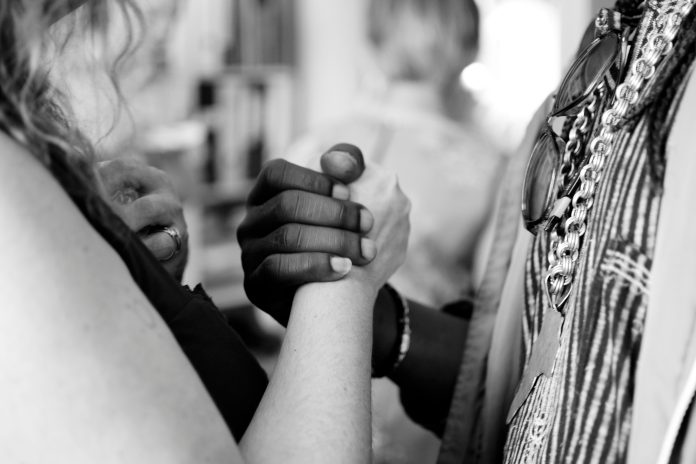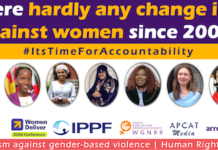On International Human Rights Day on 10 December and in the lead up to Universal Health Coverage Day on 12 December, experts have called upon protecting sexual and reproductive health and rights of all girls and women and other gender diverse communities including persons with diverse disabilities. Ending all forms of gender-based violence is also critically important to deliver on the SDGs.
“It has taken us over two decades to reach this point where we are talking about the human rights perspective, implementation of the sustainable development goals, implementation of the UN Convention on the Rights of Persons with Disability and interlinking it with other Conventions. Women and girls with disabilities face 4-times greater gender-based violence and sexual harassment as compared to other women and girls,” said Abia Akram, founder-leader of National Forum of Women with Disabilities and leads Disability Rights group at Asia Pacific Regional Civil Society Engagement Mechanism. She was speaking in the SHE & Rights (Sexual Health with Equity and Rights) session as part of the ongoing 16 Days of Activism against gender-based violence.
“Recent research done by us indicated that even family members and care support workers are perpetrators of gender-based violence when it comes to women with disability. Another challenge that women and girls with disabilities, with all their diversities, face is in climate change related humanitarian responses (like floods). Barriers faced by them include communication barriers, policy and legislative barriers and social constraints. We have to bring systemic changes to remove these barriers. In many South Asian countries, even the support systems at the referral pathways are not accessible for them,” said Abia Akram.
“Persons with disability need to be treated as equals with other citizens and have the right to talk about gender-based violence and sexual harassment faced by them. But the support and protection systems (including police stations, crisis centres) are not even wheelchair accessible. So even lodging a report against gender-based violence becomes difficult for them. We have to make the referral systems more inclusive and responsive to the needs of women and girls with disability,” added Abia.
Anti-rights push threatens gender equality and human rights
“Not everything that is termed ‘Geneva’ advances human rights, and the Geneva Consensus Declaration is one such example. The Geneva Consensus Declaration supports the anti-rights movement in the garb of ‘protection of family values’ which a lot of us in Africa value so much. So, they have found ‘perfect’ ways to advance their rhetoric under the garb of protecting the family. The Geneva Consensus Declaration does not recognize the international human right to safe abortion,” said Stephanie Musho, lawyer and regional coordinator, Catalysts Africa.
“The Geneva Consensus Declaration’s stance against abortion and its emphasis on ‘pro-life’ policies could limit access to essential reproductive health services, including for women with disabilities, who may face unique health risks or challenges that necessitate a more comprehensive approach to sexual and reproductive health and rights. Women with disabilities require accessible and tailored information, services, and support to make informed decisions about their sexual and reproductive health,” said Abia Akram.
Debanjana Choudhuri, executive director, WGNRR (Women’s Global Network for Reproductive Rights – one of the co-hosts of SHE & Rights initiative) said, “What is alarming is that some governments are trying to underplay women’s rights, particularly sexual and reproductive health and rights. We are seeing a huge pressure to dilute the language around rights, equality and equity. Also, with the imminent changes in US administration we are anticipating backlashes. Whatever happens in the US impacts other countries and Asia is no exception.”
“Anti-rights movements are raising their heads. These movements are highly organized and extremely well resourced. Also, there is a huge push within the anti-rights groups to create narratives to further increase the gap of access for sexual and reproductive health services. We anticipate that in the coming months there will be further cutdowns on advocacy programmes for sexual and reproductive health, safe abortion services, comprehensive abortion care, and this will impact girls and women. It will deprive them of their bodily autonomy and choice. If we do not unify now, the opposition will take the space, and they will create (harmful) narratives around ‘family systems’ and ‘traditional values’ which are going to hurt us even more in the coming years.”
“The rhetoric against sexual and reproductive health and rights is increasing. It is coming from various angles- we are hearing again about ‘traditional values’ (such as, where a woman’s place is in the kitchen) and pro-natal narratives are emerging which are extremely dangerous. Many countries in Asia are talking about their declining fertility rate and clamouring for women to bear more children,” she said.
Debanjana added that “In India, we have seen positive changes in the safe abortion law. But that is yet to be translated fully into action on the ground, and we still see a lot of stigma and taboo around this issue. We are also working with lawmakers and legal experts in the Philippines – where elections are to be held next year- to understand their perceptions on sexual and reproductive health and to carry discussions on sexual and reproductive health, particularly safe abortion rights.”
Intersectional response to ending gender-based violence and protecting disability rights & gender justice
“It is crucial to recognize that the intersection of ageism, sexism and systematic exclusion affects violence faced by women and girls and creates additional layers of vulnerability and marginalization. Intersectionality reminds us that gender-based violence cannot be disentangled from other forms of oppression, whether rooted in disability, socioeconomic status, sexual orientation and/or gender identity,” said Benedicta Oyedayo Oyewole, community engagement and partnership lead, International Planned Parenthood Federation (IPPF) Africa Region.
Benedicta added, “In Africa we face an increase in anti-rights movements, as we can see the anti-homosexuality act of Uganda that criminalizes LGBTQI+ identities, or the rising homophobia in Ghana. Patriarchal politics and cultural forces are pushing back against the gains of feminist movements. This backlash has manifested in legislation that criminalizes and underfunds gender equality programmes and excludes marginalized communities. The disability justice movements, feminist movements, LGBTQI+ and women’s rights movements, people’s struggles against oppression and gender-based violence – all must come together. Our struggles are interconnected, and our victories will only be sustained if they are built on the foundation of mutual respect and collaboration.”
“We must push back against the rhetoric that seems to undermine equality and justice. Together we can frame disability rights, gender equality and elimination of gender-based violence as non-negotiable human rights and ensure that crisis centers are accessible to addressing the unique economic and other vulnerabilities of persons with disabilities. We must also confront the reality that gender-based violence is a symptom of broader systems of oppression, like patriarchy, ableism, racism and economic inequality reinforcing one another,” said IPPF’s Benedicta.
Stephanie Musho said that “Kenyan President enacted a new policy in 2023, which is advancing the anti-rights agenda and mainstreaming it in legal and policy frameworks. Through this policy, they are encouraging women to stay even in an abusive marriage. This ‘family’ policy is deeply rooted in the global anti-rights anti-gender movement, which is spreading its tentacles across the African continent. They started with the anti-homophobic Bills and laws that have been sweeping Africa in Ghana, Uganda, Kenya and Congo. Two years ago, Mozilla Foundation found that one of these main opposition groups operating in East Africa called CitizenGO- an ultra-conservative advocacy group founded in Madrid, Spain – are paying unsuspecting and unemployed Kenyan youth to advance misinformation and disinformation on Twitter/X. CitizenGO has also been part of the movement that has completely ruptured sexual and reproductive health and rights and protection of women and girls and sexual minorities. The anti-rights movements are well financed and well resourced, and they are advancing their detrimental positions against us feminists and the rights movement.”
“There is no way you can advance human rights if you say that you work on disability rights, but you are not going to address LGBTQI+ rights, or you are not going to address safe abortion rights, or you draw the line where comprehensive sexuality education starts. Human rights are indivisible, and we cannot cherry-pick them,” said Stephanie Musho.
Shobha Shukla, Coordinator of SHE & Rights (Sexual Health with Equity and Rights) said that “Our governments have promised sustainable development for everyone by 2030 – where “No One is left Behind.” Gender equality for all is enshrined in the SDGs. But progress is at best sketchy, and in so many aspects regressive. Unless we dismantle patriarchy, ensure racial equity, ensure justice for all gender diverse people, ensure disability inclusion and justice, end ageism and ableism, how will we end all forms of gender-based violence?”
She adds, “Economic justice, redistributive justice, social and cultural rights, climate justice, health justice, accountability to peoples are critical if we are to deliver on gender justice. The only pathway to a socially just and ecologically sustainable world for all of us and our planet is if we walk the talk on a Feminist fossil-fuel free future. The upcoming International Human Rights Day (10th December) and Universal Health Coverage (UHC) Day (12th December) and ongoing 16 Days of Activism against all forms of gender-based violence give us an opportunity to connect some dots.”







